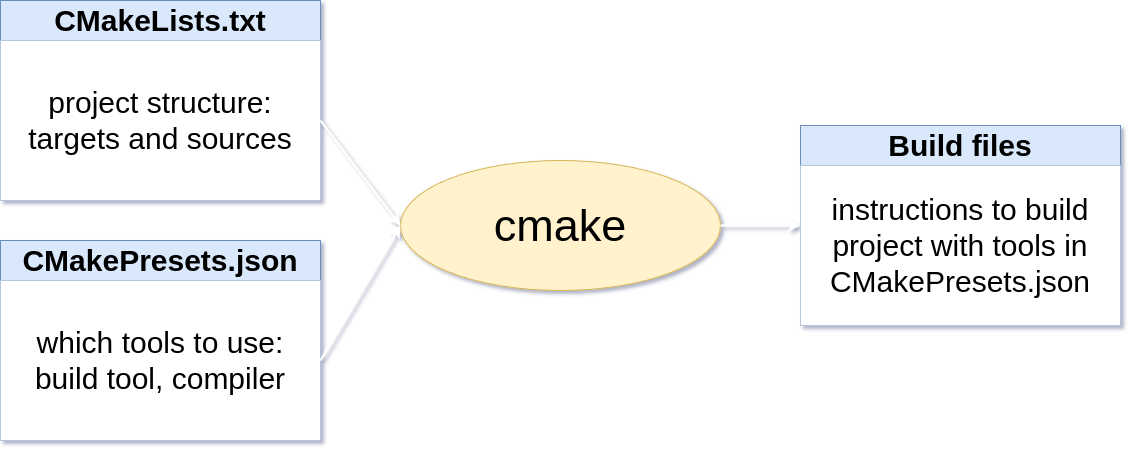?
Slides configuration
Slide Notes:
Hide
On Slide
On Separate Page
Merge Fragments
Show Slide Numbers
Apply
Reset
How to save slides as pdf?
Open the print dialog.
Change
Destination
to
Save to PDF
.
Change
Layout
to
Landscape
.
Change
Margins
to
None
.
Disable
Print headers and footers
option.
Enable
Print backgrounds
option.
Click the
Save
button.
Choose a filename and destination.
# C/C++ Programming ## Labo 1 --- ## Installing the right tools --- * clang * clang-tidy * clang-format * cmake * ninja * ... --- Long list of tools that all need to be the correct version. --- Use a devcontainer with all the right tools instead! --- ## Compiling code using clang <https://clang.llvm.org/> --- ### Why clang? * Excellent compiler * Only one that already supports import std 😉 --- ### Before C++20 ```c++ [] // main.cpp #include <iostream> int main() { std::cout << "Hello, world!\n"; } ``` --- ### Piece of cake! 😎 ```bash clang++ -o helloworld main.cpp ``` ```bash ./helloworld ``` Note: * helloworld is name of executable * run with `./helloworld` * gcc compiler also works * `g++ -o helloworld main.cpp` --- ### C++23 ```c++ [] // main.cpp import std; int main() { std::println("Hello, world!"); } ``` --- ### Hmmm... 🤔 <!--- cSpell:disable ---> ```bash clang++ -std=c++23 -stdlib=libc++ \ -Wno-reserved-identifier -Wno-reserved-module-identifier \ --precompile -o std.pcm /usr/lib/llvm-19/share/libc++/v1/std.cppm ``` <!--- cSpell:enable ---> <!--- cSpell:disable ---> ```bash clang++ -std=c++23 -stdlib=libc++ \ -fmodule-file=std=std.pcm -o helloworld main.cpp ``` <!--- cSpell:enable ---> * Build std module first * Then build main.cpp and link std module --- ## Exercise --- 1. Clone <https://gitlab.apstudent.be/cpp-programming/devcontainers-labo-1.git> 2. Open `exercise_1` with `vscode` or `clion` 3. Start devcontainer 4. Try compiling and running the two examples --- ### Multiple source files --- ```c++ [] // helloworld.cpp export module helloworld; import std; export void hello() { std::println("Hello, world!"); } ``` ```c++ [] // main.cpp import helloworld; int main() { hello(); } ``` --- ### Ouch!? 😬 <!--- cSpell:disable ---> ```bash clang++ -std=c++23 -stdlib=libc++ \ -Wno-reserved-identifier -Wno-reserved-module-identifier \ --precompile -o std.pcm /usr/lib/llvm-19/share/libc++/v1/std.cppm clang++ -std=c++23 -stdlib=libc++ \ -fmodule-file=std=std.pcm --precompile -x c++-module -o helloworld.pcm helloworld.cpp clang++ -std=c++23 -stdlib=libc++ \ -fmodule-file=std=std.pcm -fmodule-file=helloworld=helloworld.pcm -o helloworld main.cpp ``` <!--- cSpell:enable ---> ```bash /usr/bin/ld: /tmp/main-2b3cf5.o: in function `main': main.cpp:(.text+0x5): undefined reference to `hello@helloworld()' clang++: error: linker command failed with exit code 1 (use -v to see invocation) ``` Note: * Hard to get right * Still results in linker error * We don't want to do this --- ### Let's avoid doing this manually * Gets complex very quickly * Use build tool instead! 👍 ---  <https://cmake.org/> --- Build system generator. Note: * Generates the required files to build the project with the desired tools * Two phases: configure and build * Configure: generate build files from project setup and tools * Build: produce executable by running build files using build tool and compiler ---  ### Step 1: Configure ---  ### Step 2: Build --- ### CMakeLists.txt ```cmake cmake_minimum_required(VERSION 3.30 FATAL_ERROR) # mandatory # create a c++ project with name HelloWorld project(HelloWorld LANGUAGES CXX) # add a new target: executable with name hello_world add_executable(hello_world) target_sources(hello_world PRIVATE FILE_SET CXX_MODULES FILES # add module source files here helloworld.cpp PRIVATE # add old-style source files here main.cpp ) ``` Note: * lines not shown are configuration to support modules * main.cpp should be the only old-style source file * all other source files should be modules * project is allowed to have many targets --- ### CMakePresets.json <!--- cSpell:disable ---> ```json "configurePresets": [ { "name": "clang-debug", "generator": "Ninja", "binaryDir": "${sourceDir}/build/${presetName}", "cacheVariables": { "CMAKE_CXX_COMPILER": "/usr/bin/clang++", "CMAKE_CXX_FLAGS": "-stdlib=libc++ -D_LIBCPP_HARDENING_MODE=_LIBCPP_HARDENING_MODE_DEBUG", "CMAKE_EXE_LINKER_FLAGS": "-lc++ -lc++abi", "CMAKE_BUILD_TYPE": "Debug" } } ] ``` <!--- cSpell:enable ---> Note: * where to output object files and executable * which build system to use * which compiler to use * select standard library (and enable bounds checks) * ... --- ### Commandline CMake --- ```bash # Step 1: Configure project cmake --preset configure_preset_name ``` ```bash # Step 2: Build target cmake --build --preset build_preset_name ``` ```bash # Step 3: Run executable ./build/configure_preset_name/executable_name ``` --- #### Example ```bash cmake --preset clang-debug ``` ```bash cmake --build --preset clang-debug-build ``` ```bash ./build/clang-debug/hello_world ``` Note: * configure preset = clang-debug * build preset = clang-debug-build * target executable = hello_world --- ### VSCode Integration --- <video controls width="600"> <source src="/cpp-programming-slides/slides/session_01_labo/assets/vscode_cmake_select_config.mp4" type="video/mp4"> <img src="/cpp-programming-slides/slides/session_01_labo/assets/vscode_cmake_select_config_1.png" alt="vscode cmake select config"> </video> Select the configuration preset `clang-debug` from the vscode command palette. Note: * Open command palette: Ctrl+Shift+P * But should ask to select preset automatically --- <video controls width="800"> <source src="/cpp-programming-slides/slides/session_01_labo/assets/vscode_cmake_build_run.mp4" type="video/mp4"> <img src="/cpp-programming-slides/slides/session_01_labo/assets/vscode_cmake_build.png" alt="vscode cmake build"> </video> Build and run the project using the cmake buttons in the vscode status bar. Note: * CMake integration can be found in the status bar * Build, Run, Debug --- ### Exercise --- 1. Clone <https://gitlab.apstudent.be/cpp-programming/devcontainers-labo-1.git> 2. Open `exercise_2` with `vscode` or `clion` 3. Start devcontainer 4. Try configuring and building the project 5. Try running the project --- ## Compiler warnings, Static analysis, and Code formatting --- Tools to help you write quality code. --- ### Compiler warnings --- They exist for a reason. --- Enable all of them and treat them as errors! --- <!--- cSpell:disable ---> ```cmake target_compile_options(hello_world PRIVATE "-Wall;-Wextra;-Wpedantic;-Wshadow;-Wconversion" "-Wsign-conversion;-Wdouble-promotion;-Wextra-semi" "-Wnon-virtual-dtor;-Wold-style-cast;-Wcast-align" "-Wunused;-Woverloaded-virtual;-Wnull-dereference" "-Wimplicit-fallthrough;-Wformat=2;-Werror" ) ``` <!--- cSpell:enable ---> Add to each target in `CMakeLists.txt`. --- ### Static analysis clang-tidy --- * Check [C++ Core Guidelines](https://isocpp.github.io/CppCoreGuidelines/CppCoreGuidelines) * Check for potential bugs * Check naming conventions --- ```cmake # look where clang-tidy is installed find_program(CLANG_TIDY NAMES clang-tidy REQUIRED) # enable clang-tidy for the hello_world target set_target_properties(hello_world PROPERTIES CXX_CLANG_TIDY "${CLANG_TIDY}" ) ``` Add in `CMakeLists.txt` to run as compilation step. Note: * Extra arguments required for clang-tidy to make it work with modules. * Violations will be listed as compilation errors. --- ### Formatting code clang-format --- Automatically format source code. --- <video controls width="800"> <source src="/cpp-programming-slides/slides/session_01_labo/assets/vscode_clang_format.mp4" type="video/mp4"> vscode clang-format demo </video> --- ### Exercise --- 1. Clone <https://gitlab.apstudent.be/cpp-programming/devcontainers-labo-1.git> 2. Open `exercise_3` with `vscode` or `clion` 3. Try configuring and building the project 4. Run clang-format in `helloworld.cpp` 5. Solve the clang-tidy error in the `Hello` function 6. Add `// NOLINT(bugprone-exception-escape)` to the `main` function (this is a violation we can't fix yet)